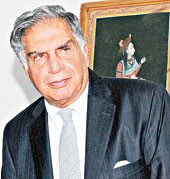 |
Red carpet reporting with no access to what’s actually going on inside the venue is throwing up amusingly inaccurate stories all over the media. One such vastly bemused celebrity figure has to be the venerable Ratan Tata whose filmland connection doesn’t stretch beyond his acquaintance with Simi Garewal.
So imagine the fantasy in reporting when Ratan Tata was listed as one of the celebrity guests at the Saif-Kareena wedding, that too just a little after Khan’s Wasabi fiasco at Tata’s hotel in south Mumbai. The truth: Ratan Tata was simply going into his own hotel, dressed as always in his formal suit, when the cameramen standing outside the Saif-Kareena wedding reception popped the flashbulbs. Since journalists today are a lazy lot and make up full-length reports based solely on the photographs that reach their work tables, it was simply presumed that Ratan Tata had also attended the wedding. As if Tata couldn’t have entered his huge hotel for anything else.
It happened again last weekend, this time at Tata’s hotel in the suburbs. The flashbulbs were in full attendance outside the venue while Anil Ambani’s guest Steven Spielberg and Amitabh Bachchan had their chat inside, along with all the big names of the Hindi entertainment world. Ratan Tata happened to drop in for a private dinner at the Chinese restaurant with very close family members and had nothing to do with Spielberg, Amitabh or Ambani. Of course, nobody bothered to check Ambani’s guest list.
Ratan Tata must have had a hearty chuckle when a daily in the south actually made a story out of his presence at the hotel and wrote about an exclusive and confidential high-level meeting between Tata and Spielberg and Amitabh. Soon others picked it up and repetition soon gave fiction the dignity of a fact. A much-circulated daily tabloid out here in Mumbai too had a reference to Tata picking up a Wharton graduate for his new sky adventure (the merger with Air Asia), ending the item with a supposedly funny punch line about him checking this out with the other Wharton alumni, Anil Ambani, at the Spielberg meeting. It really rocketed imagination passing off as the truth to sky level!
So far, since neither Ratan Tata nor his office has issued a denial, it will go down as a concrete fact that he was indeed a part of the Spielberg, Bachchan, Ambani party. And that he was a guest at Saif’s wedding reception. Never mind if both times he simply happened to be going into his own hotel and was too much of a gentleman to be rude to the cameramen standing outside. Thus, willy-nilly, a much-respected industrialist with zero interest in Hindi film stars gets clubbed with the likes of the Ambani brothers. And all because of unchecked red carpet reporting!
The same syndrome of lazy reporting has led to a stack of stories on Vidya Balan, Kareena Kapoor and changing times where the audience and the filmmakers are willing to let them continue working much after marriage, with Kajol quoted as a rare exception. If only TV and tabloid journalists bothered to check on their facts they’d realise that this is not a new trend out here. It’s perhaps only the Punjabis (Kapoors, Khannas and Deols) who expected Babita, Neetu Singh, Dimple et al, to give up make-up for a mangalsutra.
Kajol is a Maharashtrian-Bengali mix and both these regions have never had a problem with working wives or mothers. Kajol’s aunt, the very Maharashtrian Nutan, was always married when she had the big hits of her life (Saraswatichandra, Milan to name just two). Saif Ali Khan grew up watching his mother take off for the studios while he went to school. Some of Sharmila Tagore’s best work (Daag, where she had an intensely romantic role opposite Rajesh Khanna, Mausam, where she played a crass prostitute, Amar Prem, where she sang in a kotha), came after marriage and motherhood. Moushumi Chatterjee was already married when she became a Hindi film actress and did romantic roles with Rajesh Khanna, Amitabh Bachchan, Rishi Kapoor, Jeetendra, Sanjeev Kumar and a host of other heroes. She even played a vulnerable virgin in Roti Kapada Aur Makaan and pulled it off very successfully.
What a sad comment it is on journalism today that tabloid tales and television bytes are content skimming the surface in their quest only for a sensational heading. In the bargain, facts and more substantial information have truly been compromised.
Bharathi S. Pradhan is editor, The Film Street Journal










